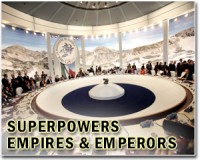| . |  |
. |
Berlin (UPI) Jan 6, 2011 Because of its controversial media and tax policies, Hungary has clashed with the European Union just as Budapest is at the helm of the 27-member body. The center-right government led by Prime Minister Viktor Orban shocked observers across Europe when it introduced a media law that many say curtails press freedom. A few days later, more than a dozen Western European companies complained they're being discriminated against by a new Hungarian crisis tax. The European Commission has since said it would investigate the tax and the body is likely to closely scrutinize what Budapest is doing -- Hungary since Jan. 1 has taken over the rotating six-month presidency of the EU. "Especially the media law casts a cloud on the Hungarian presidency," Kai-Olaf Lang, a Hungary expert at the German Institute for International and Security Affairs, a Berlin think tank, told United Press International in a telephone interview Wednesday. "The EU will now very closely watch Orban's future domestic policies and its performance at the helm of the EU." Orban became prime minister last April after his Fidesz party won the elections in a landslide. He has since embarked on a sort of "conservative revolution" that is aimed at restoring the economic and political clout of Hungary, a nation of 10 million that has been plagued with a recession and a budget crisis. Yet the conservative revolution has worried critics who say Orban is steering a too nationalist course, amassing too much political control and pursuing policies that go against the EU's values. The new regulatory authority, for example, can impose heavy fines on media outlets and tries to turn state-owned news agency MTI into a public loudspeaker, Lang said. The so-called crisis tax, imposed on the telecommunications, retail and energy sectors, has infuriated large Western companies. A group of them, including German utilities RWE and Eon, telecoms giant Deutsche Telekom and Dutch bank IN in an open letter complained that the tax was drawn up to milk large foreign corporations while sparing domestic firms. The two recent policies and Orban's general strategy of power consolidation has launched a conflict with the EU -- and at the worst possible time, Lang said. "The EU is interested in having a presidency that's capable of acting but at the same time it wants one that honors key values of European integration -- and press freedom is one of those," Lang told UPI. "While there won't be any short-term reactions, the EU will definitely loot out options for sanctions."
Share This Article With Planet Earth
Related Links Learn about the Superpowers of the 21st Century at SpaceWar.com Learn about nuclear weapons doctrine and defense at SpaceWar.com
 US, China pledge cooperation
US, China pledge cooperationWashington (AFP) Jan 5, 2011 US Secretary of State Hillary Clinton and her Chinese counterpart Yang Jiechi vowed Wednesday that their countries would cooperate closely despite differences on China's currency and other issues. "We are preparing diligently for the upcoming state visit by (Chinese) President Hu Jintao," scheduled for January 19, Clinton said as she posed for photographs with Yang at the State Department. ... read more |
|
| The content herein, unless otherwise known to be public domain, are Copyright 1995-2010 - SpaceDaily. AFP and UPI Wire Stories are copyright Agence France-Presse and United Press International. ESA Portal Reports are copyright European Space Agency. All NASA sourced material is public domain. Additional copyrights may apply in whole or part to other bona fide parties. Advertising does not imply endorsement,agreement or approval of any opinions, statements or information provided by SpaceDaily on any Web page published or hosted by SpaceDaily. Privacy Statement |